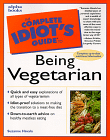|
1. Improve your health. Thousands of peer-reviewed studies
link meat with disease1,2,3
and fruits & vegetables with better health.4,5,6
The science on this is clear, consistent, and overwhelming.
Newest: Older adults who are vegan need 58% less meds. (VegNews)
2. Help the Earth. It takes 16 pounds of grain to make a
pound of beef.(source)
So compared to plant foods, that's 16 times as much pesticides,
more water, more energy use, more climate change, more
deforestation, and on and on. And don't even get us started on
all the waterways polluted by livestock waste. (more...)
3. Reduce suffering. Most people would be outraged if
someone ate their cat or dog but most of those people eat other
animals and think nothing of it. So if we believe that
certain animals deserve to not be eaten, why eat different
animals just because we never got close to them?
Vegetarian & Vegan Nutrition
|
All vegetarians should take a Vitamin B12 supplement, and
those who don't get enough sun should take vitamin D. Good
websites for nutrition info include:
The ideas that vegetables are deficient in protein or
that they're incomplete proteins is an urban myth.
The science says that protein is easy to get. See all
about protein.
VegWeb.
Thousands of vegan recipes, many with pictures! A true
community, with contributions and discussion from its users.
Fat-Free
Vegan. Hundreds of well-organized recipes.
Fat-Free
Vegetarian. Around 5000 lowfat vegetarian recipes.
VegSource.
Over 5000 recipes. See especially Marla's
section.
Vegetarian
Resource
Group. Choose a category (like "Lentil
Mania"), and then see several complete recipes, all on the same
page.
Here's some food for thought:
|
Beginner's Guides to Vegetarianism
|

Vegetarian Beginner's Guide
by the editors of
Veg. Times

$1.65
+shipping
|

Become a Vegetarian in Five
Easy Steps
by Christine H. Beard

$2.98
+shipping
|

Complete Idiot's Guide to
Being Vegetarian
by Suzanne Havala & Robert
Pritikin

$2.84
+shipping
|

The Perfectly Contented
Meat-Eater's Guide to Vegetarianism
A beginning
guide with a huge dose of humor.
by Mark Warren Reinhardt

$3.00
+shipping
|
See more vegetarian books: Cookbooks
Pregnancy & Children
Nutrition
Environmental Benefits
|
|
Join the Vegie group on Kiva
|
Kiva lets individuals make microloans to people in
third-world countries. I've made nearly 100 loans there myself.
There's even a Kiva
team
for vegetarians there.
Myths about Vegetarianism
|
- "Humans were designed to eat meat."
- "Vegetarians have a hard time getting protein."
- "Plant proteins are incomplete."
- "Vegetable oils are healthy."
- "Tofu is a low-fat food."
- "Milk is necessary for strong bones."
- "Hitler was a vegetarian."
All of the above statements are myths. For the full story see vegetarian
myths debunked.
See our massive list of what
vegetarians and vegans eat.
Vegetarians on Wall Street
|
Some companies making vegetarian foods are publicly
traded. See them on our list of socially-responsible
stocks.
Vegetarian singles can connect with each other at Veggie
Connection. |
Vegetarian restaurants in Austin
|
Austin is a very veg-friendly city. Check out our list
of restaurants.
Vegetarian
Resource
Group (VRG). VRG is impressive -- they offer a
free email newsletter, write & publish their own exceptionally
practical books, have a guide to raising a vegetarian family,
produce lesson plans for teachers, and more. Wow!
The
Vegetarian
Site. They bill themselves as a "vegetarian
portal", and that's pretty accurate. From an online store to
articles about animals, nutrition, and the environment, they're
clearly trying to cover everything.
Vegan.com.
These guys are hilarious. The slogan on their site is
"Disparaging meat since 1997"! A lead article starts, "Ball Park
Franks may plump when you cook 'em, but a recent batch may also
kill you when you eat 'em..." A recipe collection, activist
updates, their own interview with Howard Lyman, what more do you
want?
VegSource.
The kitchen sink of vegetarianism. If you were wondering about
it, it's here. Downsides: Tons of annoying advertising, and
mean-spiritedness towards perceived enemies (in the editorial,
but especially in the Comments sections).
|



